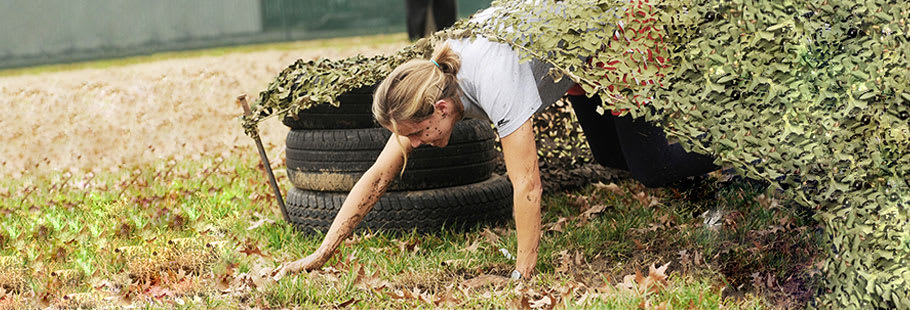Surviving Your First Week as a PhD Student
Looking ahead to a PhD and wondering how you'll cope with the challenges of postgrad research? Having recently begun her own PhD, Holly Dale shares some advice on what to expect.
Congratulations! You have managed to arrive at the pinnacle of academic study: the PhD. Your hard work has paid off, and you are about to embark on a challenging, yet rewarding, journey of scholarly enquiry. Pat yourself on the back, you deserve it.
Now you may not feel as if a pat on the back is really apt in YOUR particular situation. You may not even feel like you are supposed to be here. Do not worry, it's perfectly rational at this stage to be thinking to yourself ‘What the hell am I doing?’. These feelings, I can assure you, are all completely normal: imposter syndrome is a real thing. Nevertheless, you are here, and you are about to start a PhD, so how are you going to survive it?
There's plenty of advice I could give you about how to survive your first week as a PhD student; from the frankly mundane, including registering at your local GP practice, to the absolutely essential, such as finding out where to acquire your regular coffee fix.
However, for simplicity’s sake, I have condensed this seemingly-endless list down to the 5 key things I believe every PhD student should bear in mind during their first week.
#1 Keep a notebook on hand at all times
Your first week will likely be filled with an almost overwhelming amount of information, including important details on where to go if you need help, key figures in your department and/or relevant to your programme, and key deadlines for your PhD.
No matter how good your memory is, as your senses are bombarded with new faces, surroundings and sounds, it is highly unlikely you will be able to retain all of this information. Since at least some of it is likely to be invaluable at some point in the not-too-distant future, it's important that you take notes as the information comes in: I suggest carrying around a small notebook around with you, and a pen, for this purpose. Don't worry about your scribblings being neat or tidy, just write everything down you can in the moment, and go over your notes later, when you're calmer, to pick out the crucial information.
#2 Don't feel obliged to attend EVERYTHING
It's likely your University and/or programme will put on a lot of formal and informal events during the first week. These will be a mixture of mandatory induction activities, which you should prioritise, and optional social gatherings aimed at promoting student interaction.
It can often feel quite demanding attending all of these activities, especially if you have only just moved to a new city and are still getting accustomed to your new surroundings. Do not feel guilty if you are too exhausted to attend absolutely everything that is advertised in your first week. Knowing when you actually need a little bit of time to yourself, to simply relax or work your way through the inordinate amount of ‘life admin’ that comes with moving to a new place, is a valuable skill to learn. Prioritise ‘self-care’ early and start as you mean to go on - I promise you'll be grateful for it in the long run!
#3 It's never too early to start networking
Networking doesn't have to be reserved for formal academic gatherings, such as conferences or a post-seminar wine reception. It can actually start with a simple drink down the pub on a Friday afternoon with your fellow PhD students, or over coffee in the break room.
I highly recommend you just chat to people. Get to know them, including both their academic and non-academic interests; striking up a relationship early on will allow you to establish those links with people around you, and open up the dialogue to more cooperative interaction. After all, you never know where that first collaboration or insight may come from!
If, like me, you're terrible with names and faces, I suggest you keep a record of people's names; potentially with a couple of identifying features, and key facts you've learned during your conversations (e.g. Becky, long brown hair, glasses, has skills in data analysis, likes hiking). A useful place to do this is in a note on your phone. That way, when you cross paths again, you can acknowledge that person by name, and already have some information about them to help strike up a conversation. This behaviour is likely to lead to more fruitful and cooperative professional relationships in the future.
However, building your connections does not and should not only have to be about furthering your career. Bear in mind that doing a PhD is HARD, and you may want to call upon some of these people in the coming weeks or months for a friendly ear to listen to you rant about how frustrated you are, or simply to get together for a social activity based on a mutual interest. This is especially important if you have moved to a new place where you do not know anyone, and are without a local support system. Firm friendships will allow you to bear the difficulties that come with PhD study, without the risk of burn out. Don't worry about finding your best friend immediately, though; this may come with time. Just be friendly, talk to lots of different people, and share contact details where you can.
#4 Don't compare or compete
Everyone has their own path to PhD, and beyond. Whilst some will come to their doctorate after years working in research or industry, others may be fresh out of their Masters, or even undergraduate, degrees. Similarly, some will have a clear plan for their PhD, and possibly even further (I was definitely planning my post-doc before even securing my PhD position!), but plans can change, and what happens over the next few years may place you on a path you could never have imagined.
For that reason, you shouldn't worry too much if you are the kind of new PhD student who feels like they have no clue where to start. Many a student will identify as being in this position, especially if they have applied to an advertised project, rather than writing their own research proposal. If you are one such individual, I recommend talking to your supervisor(s) and getting a firmer picture of their ideas for the project. Ask for some papers they recommend you read, to get you started, and come back to them with your thoughts and ideas. Can you put a particular spin on the project, or take it in a particular direction?
Talking with your supervision team will give you a better idea about what you're supposed to be doing, and will allow you to claim some authority and autonomy over the whole thing - essential for any PhD student, who is essentially expected to submit a body of independent and original research work as their thesis.
#5 Get support in place sooner rather than later
Regardless of your specific support needs, it's important to find out what help is available to you before you start, and to put support measures in place as soon as possible. Even if you feel like you don't need any specific support at this particular stage, it's vital you set it up should you need it early on, as these procedures are often saturated with bureaucracy, and can take weeks to set up. If you leave it until you actually need the support, such as an extension on a deadline, or financial aid to pay for counselling services, it may be too late. It is therefore best to set these things up as soon as you arrive, if not before you actually start your programme.
Even if you have no support needs, it's useful to find out where you can go, and who you should contact, should they arise. Registering at your local GP practice should be the first port of call for all new PhD students, no matter what your specific circumstances are.
It's also important to remember that family and friends, both old and new, can also provide a valuable source of support when things get tough. Even if it's just calling home, or meeting up for coffee with an old friend, maintaining this connection to the people who love you will allow you to ride the peaks and troughs that will inevitably come with embarking on PhD study. Keeping those links open will not only reduce the loneliness that can come with moving to a new place, or beginning on a journey of independent research, but will also support good mental health. Your emotional needs are just as important as your physical ones!
Just remember to breathe! The next few years are likely to be extremely busy, and you'll be surprised by how quickly the time passes when you finally get stuck in. Along the way, you will likely have plenty of absolutely astounding times, such as getting your first paper published, but there will also be just as many difficult ones. In the face of these more challenging experiences, remember how fantastic you are just to have made it this far, and be proud of yourself for trying your best, no matter how your journey ends.
More importantly, enjoy it! There are few times in your life that you will get to complete a programme of entirely-independent work in an area of your choosing, still with the input and guidance of experts in your field. I wish you the best of luck, and remind you to savour this moment; it'll all be over far quicker than you realise!
Preparing for a PhD journey?
First steps into a PhD
Sofia recalls the start of her own PhD and likens the experience to being a toddler again.
The first month of a PhD
So, you know how to find your feet as a PhD student. Here, Kirsty explains what to expect from the first month of your degree.

 Continue with Facebook
Continue with Facebook





